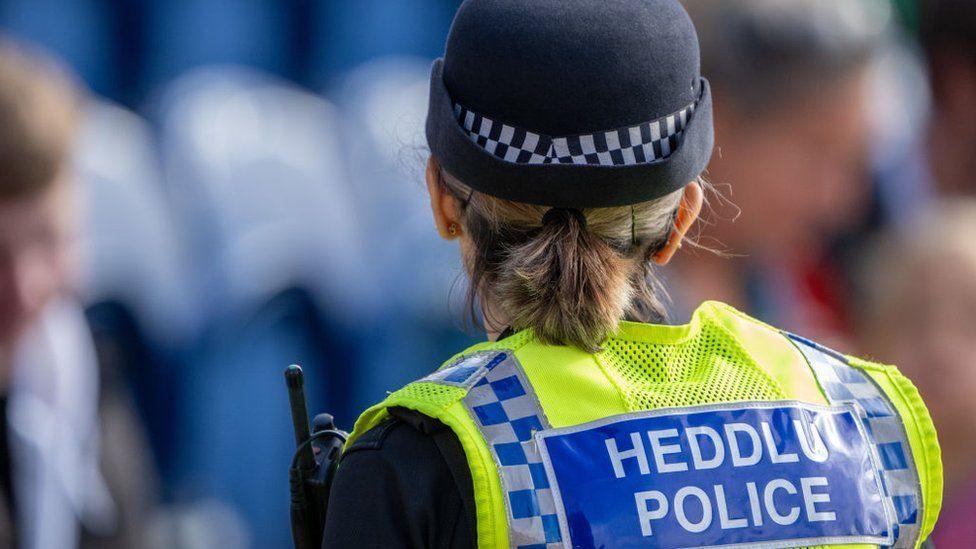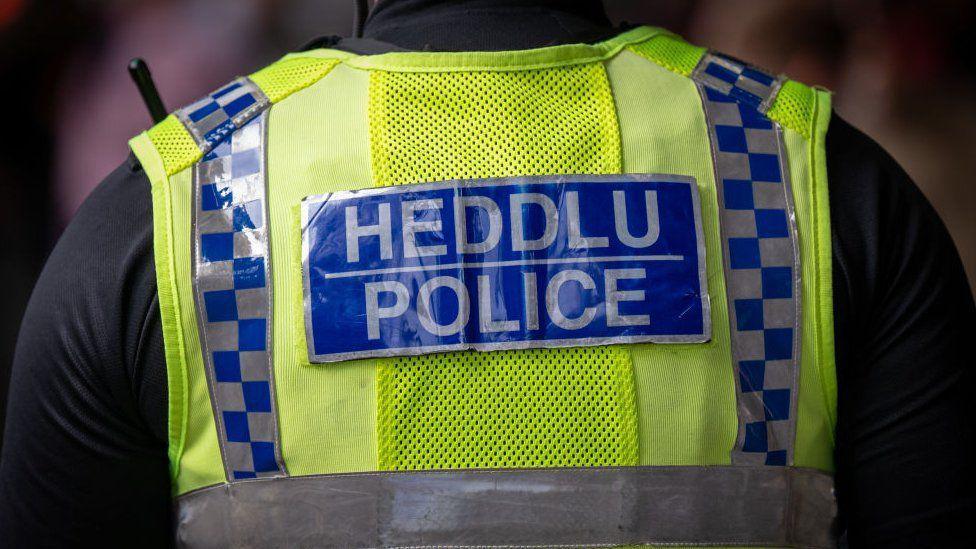Plaid decriminalise drugs call in police elections

Plaid Cymru says drugs police should focus on supply lines rather than individuals
- Published
Plaid Cymru has called for the decriminalisation of drugs, in its pitch for the police and crime commissioner elections.
The party said drugs policing should focus on supply lines rather than individuals.
It called for the Home Office to cleanse criminal records of those convicted of drugs where there are no further aggravating factors.
The PCC elections take place on 2 May.
What do police and crime commissioners do?
- Published15 April 2024
Warning voter ID could hurt May election turnout
- Published13 April 2024
Police and crime commissioners cannot set laws and only the UK government in London could decriminalise drugs.
Although they do not run police day- to-day, commissioners do set priorities for the police and their budgets.
There are four PCCs in Wales for each police area. Plaid Cymru is defending its PCC in Dyfed Powys, where Dafydd Llywelyn has been in post since 2016.
The party launched its manifesto, external for the elections on Monday, promising a more visible police service.
'Respect individual choices'
The party called for fair funding for Welsh police forces from the UK government, and for criminal and policing powers to be handed to the Senedd and Welsh government.
Plaid Cymru's manifesto said victims of anti-social behaviour should be at the centre of justice and police services, and promises to retain community police stations "where there is an operational and community reason for doing so".
The manifesto said the party believes that drugs policing should "focus on targeting supply lines and dealers in the organised drug trade rather than individual users, if those people are causing no wider harm".
It said drug users responsible for acquisitive crime, external, such as theft, "should be supported to stop their addiction".
"By introducing a policy of drugs decriminalisation, which would respect individual choices, we could better target police resources towards organised crime groups who profit from misery," it added.

Police forces should be more visible to the public, the party says
Plaid argued that traditional methods of policing drugs and organised crime have not been successful and that had led to a "hostile and violent environment", saying there should be an independent review of drug policy and policing.
The manifesto called for Dyfed Powys to be compensated for the £1m cost of policing protests at the Stradey Park Hotel.
The hotel was set to house more than 200 asylum seekers, before the Home Office scrapped the controversial plans last October.
The party said that some back-room services in the four Welsh police forces could be "more efficiently provided within one organisation as a centre of excellence", such as a Welsh Firearms Licensing Bureau.
Plaid Cymru leader Rhun ap Iorwerth said: "A decade of Tory cuts have left our police forces underfunded - with Wales getting less than its fair share of police funding per head of population.
"These challenges have been compounded by the Labour government's decision to reduce the number of Police Community Support Officers and cut funding for the Wales Police Schools Programme.
"Plaid Cymru don't believe that this is as good as it gets.
"Our manifesto is not just an ambitious and wide-ranging program of policies with fairness at its heart, but a statement of principles that Welsh justice is best served in Welsh hands."
Who is standing in these elections?
All four of the main parties in Wales are contesting the elections in Dyfed Powys, North Wales, Gwent and South Wales Police force areas.
Dyfed Powys candidates
Justin Mark Griffiths - Welsh Liberal Democrats
Ian Christopher Harrison - Conservative
Dafydd Llywelyn - Plaid Cymru
Philippa Ann Thompson - Labour and Co-operative Party
North Wales
Andy Dunbobbin - Labour and Co-operative Party
Ann Griffith - Plaid Cymru
Brian Jones - Welsh Conservative Party
Richard David Marbrow - Welsh Liberal Democrats
Gwent
Donna Cushing - Plaid Cymru
Mike Hamilton - Welsh Liberal Democrats
Hannah Elizabeth Jarvis - Conservative
Jane Helen Mudd - Labour and Co-operative Party
South Wales
Sam Bennett - Welsh Liberal Democrats
George Carroll - Conservative
Dennis Clarke - Plaid Cymru
Emma Wools - Labour and Co-operative Party
Voters will need to show photo-ID to cast their ballot.
Related topics
- Published10 April 2024
